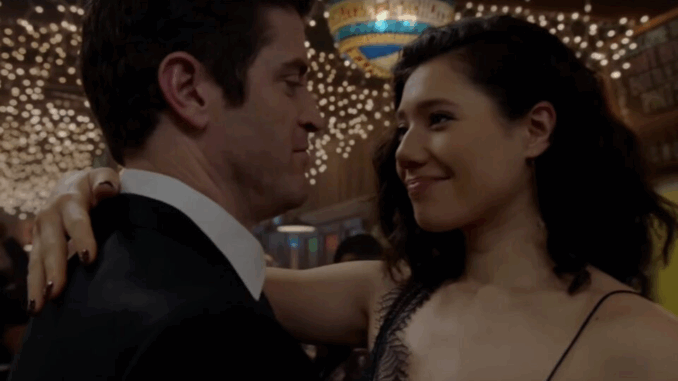
Why did Chicago Fire repeat the Brettsey arc with Violet and Carver? And why are fans so frustrated about it?
We’ve been here before — too recently, and with too much emotional investment. Violet and Carver’s relationship seemed to be heating up, only for the show to throw cold water on it with a finale twist that felt suspiciously familiar.
So let’s break it down — because we all have questions, and they’re valid.
Did Violet and Carver just go through the same storyline as Casey and Brett?
Yes. Almost beat for beat.
- Brettsey (Casey and Brett) slowly built toward romance over several seasons, finally getting together during Chicago Fire Season 9.
- But after Casey left for Oregon in Season 10, their long-distance relationship fizzled. Brett eventually ended things, even though they still loved each other.
- In the Chicago Fire Season 12 finale, they reunited and decided to build a life together — but not in Chicago.
Now, fast-forward to Chicago Fire Season 13, and we’re watching Violet and Carver… do the same thing.
- Their chemistry sparked in Season 11 and Season 12.
- They danced around their feelings.
- Just as Violet admitted she loved him, Carver said he was leaving 51.
Fans immediately recognized the pattern — and not in a good way. And when you consider that Violet and Carver first talked about their future at Bretty’s wedding, the irony is inescapable.
Why does this storyline feel worse the second time around?

Because we let our guard down.
Unlike Casey and Brett, Violet and Carver aren’t legacy characters.
They weren’t around in Chicago Fire Season 1, but they have been in the fold long enough to feel rooted. Importantly, they’re not massive stars the show needs to accommodate contract-wise.
That gave us a false sense of security.
We assumed their arc would be safe from last-minute exits and heartbreak-for-heartbreak’s-sake storytelling. We assumed we could invest in them.
Instead, we were set up for the same gut punch as before — just faster and with less emotional payoff.
Why does Chicago Fire keep doing this to its couples?
That’s the million-dollar question.
We get it: not every relationship has to be endgame. Breakups are part of life, especially in high-pressure jobs like firefighting. But this pattern has gone beyond realism and into repetition.
If a couple builds real chemistry, someone gets hurt. If someone says “I love you,” someone leaves. If we get attached, the rug gets yanked out from under us.
And we’re starting to notice.
How are we supposed to care about personal arcs anymore?
That’s what’s most frustrating.
When every romance ends in death, withdrawal, or relocation, how are we supposed to trust what we’re seeing?
Is there room for love stories that grow instead of implode? Or are we only allowed to invest in Stellaride or Mouch and Platt because everyone else is just a narrative pawn?
We’re not asking for fairy tales. We’re just asking for stability — something to believe in. Something to root for that won’t be scrapped when the next season rolls around.
Is there room for love stories that grow instead of implode? Or are we only allowed to invest in Stellaride or Mouch and Platt because everyone else is just a narrative pawn?
We’re not asking for fairy tales. We’re just asking for stability — something to believe in. Something to root for that won’t be scrapped when the next season rolls around.
So what’s next for Violet? And should we expect Carver to return?
That’s unclear. In interviews after the finale, showrunner Andrea Newman admitted the finale was written without knowing how the “ax would fall.”
So, if history repeats, we might get a guest spot down the line, a la Casey. But unless something big shifts, we’re likely looking at Violet getting another tragic reset: starting over, healing from loss, and moving on.
Again.
Honestly? It’s exhausting and more than a little off-putting. It takes the shine right off those cherry red engines.
What are we even doing anymore?
Violet and Carver could have been different. Their arc should have been different. But instead, it became a shorthand for the bigger issue at hand:
Chicago Fire is running out of emotional runway.
It keeps building romantic arcs only to tear them down before they can land. And at some point, viewers stop climbing onboard.
We want to feel something. But we also want to trust that our feelings aren’t being weaponized for a finale twist, or that love doesn’t always mean loss, not to mention that connection doesn’t ave to be a countdown to goodbye.
Because otherwise, why are we even watching?
Agree? Disagree? Have a theory? Think I need to get over it and get a life?
Let me know in the comments, or share this article with someone who will want to argue about it with you. That’s what makes it fun!